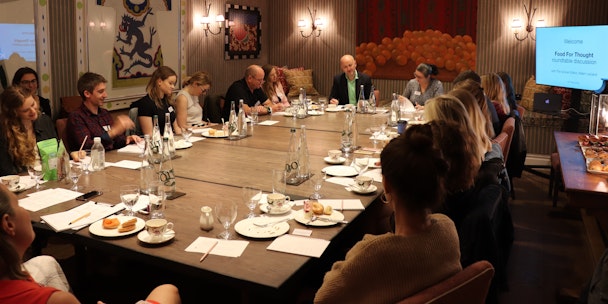Food for thought: industry expert reveals the most important trends in ethical food marketing
At our latest Kazoo roundtable session, we had the pleasure of hosting Adam Leyland, editor of The Grocer, to discuss what’s next for the food sector in 2018 and how brands can make the most of developing trends.

A scene from Kazoo's recent Food for Thought roundtable dinner.
While the insights-driven session covered a variety of topics, including health, convenience and personalisation, a key focus was the ethics of food marketing.
Adam Leyland identified three key issues in 2018: food waste, plastic and palm oil.
Food waste
In 2016, food waste experts, Wrap, revealed that1.9 million tonnes of food was wasted by the food and drink industry – the equivalent of £1.9billion. The worst part is that plenty of this food could have been redistributed to those who most need it.
The industry heard loud and clear that this was an enormous problem, and quickly rushed to sort it out.
For the last two years The Grocer has been campaigning its ‘Waste Not Want Not’ initiative, encouraging brands across the country to simply waste less food.
According to its website, the campaign had three goals:
- To double the amount of edible food being redistributed to people to 100,000 tonnes (the equivalent of an additional 100 million meals each year);
- To lobby government to introduce fiscal incentives that would ease the cost pressures of redistribution, estimated at around £100 per tonne, and in so doing level the playing field with the subsidised ‘anaerobic digestion’ market;
- To encourage greater transparency, co-operation and engagement across the food and drink industry.
The results are continuing to show, and at the beginning of 2017 more than 60 suppliers and retailers pledged to commit to double their rates of redistribution by 2020, ensuring that tens of thousands of tonnes of extra food will reach people.
Retailers are rapidly becoming more transparent on the topic, with Morrisons recently announcing it had wasted 11,000 tonnes in the past year. There’s still a way to go but the industry is on a positive, upwards journey.
Plastic
Plastic pollution is deadly serious. According to the World Economic Forum, by 2050 ‘there will be more single use plastic waste than fish in our oceans’. Millions of tonnes of plastic gets into our oceans every year, entangling fish within it and causing incredible harm to the world’s sea animals.
The world is listening, and brands have started taking on the responsibility to move us in the right direction. Iceland has led the way for retailers, pledging to completely remove plastic packaging from own label range by 2023.
And following a national petition for brands to remove plastic from teabags, PG Tips and Clipper have started doing just that.
According to Adam Leyland, the issue has become so mainstream now that product innovation is no longer the spotlight for food brands within trade press. The focus has shifted to packaging innovation, and specifically how brands are reducing plastic. In his words, “The story can be in the packaging.”
Palm oil
There is no denying that palm oil is destroying the world’s forests and significantly posing an additional threat to species already facing extinction.
My opinion? Brands have a responsibility to protect the world, and currently they are not doing enough about it.
Greenpeace recently revealed that household brands are refusing to disclose the source of palm oil, adding to concerns that many internal companies are a long way off meeting their 2010 commitment to remove deforestation-linked palm oil from supply chains by 2020.
But there are brands here in the UK moving in the right direction and leading the way for the industry.
Pip & Nut is one of them. A brand openly embracing heathy fats and unashamedly rejecting bad fats. Because of this, palm oil is completely band from every product within its portfolio and has done so since day one.
Iceland is another, famously announcing last month that by the end of 2018 100% of its own-brand products will not contain palm oil. The first supermarket to do this, hopefully others will quickly follow suit.
What can we learn?
There are lots of brands we can look to and learn from. These brands are taking ethics in the food and drink industry very seriously, making them the core of the band and what they stand for.
But there is a way to go. Brands must take personally the responsibility they have to protect the world we live in for future generations. We can’t become 100% perfect overnight but we can all begin to step in the right direction.
During the session Adam Leyland reiterated that cause-related marketing continues to hold its value for media and the general public. Put very simply, it feels good to buy into a brand supporting a cause so we all like it. While of course being for the benefit of the for-profit brand involved, it can also be a giant leap to help the non-profit and nudge the brand in the right direction.
Let’s use the budgets available to us, whether above or below the line, to protect our world and help look after each other.
Delilah Pollard is lifestyle director at Kazoo
Content by The Drum Network member:

Kazoo Communications
ETHOS
In today’s fast-moving world of every-changing audience and channel landscape, opportunities can be missed if you aren’t ready to make a move.
At...

